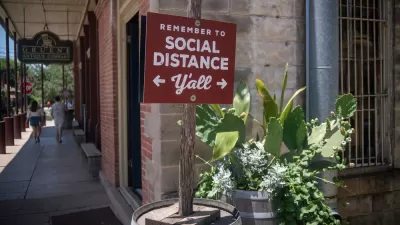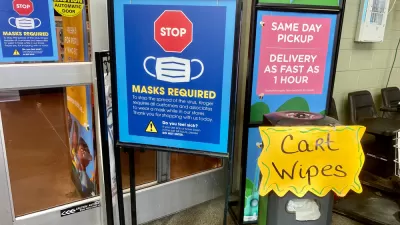Georgia Gov. Brian Kemp (R) has sued Atlanta Mayor Keisha Lance Bottoms (D) and the Atlanta City Council over the city's mask mandate, which is stricter than mask provisions defined in the governor's July 15 executive order.

At first glance, it may seem that the lawsuit filed in Fulton County Superior Court by Gov. Brian Kemp (R) on July 13 against Atlanta Mayor Keisha Lance Bottoms (R) and the 16-members of the Atlanta City Council is all about whether local governments can require residents to wear masks when a governor has issued an executive order** preempting such restrictions, similar to a dispute in Texas where the issue was seemingly resolved when Republican Gov. Greg Abbott issued a statewide mask mandate on July 2.
However, as Greg Bluestein, who covers the governor's office and state politics for The Atlanta Journal-Constitution reported (in the source article), Kemp also seeks, apparently for the benefit of the business community, "to block Atlanta from enacting coronavirus restrictions" in addition to the mask requirement that "Atlanta and a dozen other cities have adopted, defying an order from Kemp that encourages but not mandate them."
“This lawsuit is on behalf of the Atlanta business owners and their hardworking employees who are struggling to survive during these difficult times,” Kemp said in a statement. “These men and women are doing their very best to put food on the table for their families while local elected officials shutter businesses and undermine economic growth.”
With more retailers requiring shoppers to wear masks to protect the health of customers and store employees alike, the city's mask requirement would appear to be consistent with the priorities of "Atlanta business owners and their hardworking employees." Furthermore, businesses have a problem with enforcement of their own requirements, so a city ordinance would seem to strengthen it and send a consistent message to shoppers.
What might be the real target of the lawsuit
Bluestein writes that Kemp's lawsuit also target's Bottom's "July 10 decision to revert to 'phase one' guidelines [pdf] that push restaurants to close dining rooms and urge residents to leave home only for essential trips," which Kemp describes as “void and unenforceable." The city has been in Phase II since May 27. Reverting to Phase I amounts to a second shutdown, which may be of more concern to Kemp than a mandatory mask ordinance, similar to what is still unresolved in Texas.
Who decides to shut down a city or county?
As noted under the heading, County vs. State, in the post on California's economic rollback on July 13, Houston Mayor Silvester Turner and Harris County Judge Lina Hidalgo lack authority to issue stay-at-home orders. "Hidalgo and other Houston-area officials have called on Texas Gov. Greg Abbott to give the county the power to impose more restrictive measures than he has ordered at the state level."
The issue of mandating mask-wearing has progressed to a different level in Texas since the July 2 executive order by Abbott, who is hoping that it will mitigate viral spread sufficiently to preclude an economic shutdown.
“I know that many of you do not like the mask requirement," Abbott said in a recorded message, reports Jonathan Tilove for the Austin American-Statesman on July 16.
"I don’t either. It is the last thing that I wanted to do. Actually, the next to last. The last thing that any of us want is to lock Texas back down again. We must do all that we can to prevent that.”
One thing is clear in the debate over whether cities/counties or the governor gets to decide on coronavirus restrictions – without a unified approach by government, the virus wins.
Both Georgia and Texas are among 18 states listed in an unpublished document prepared by the Centers for Disease Control and Prevention that suggests that more stringent protective measures be implemented, including "limiting social gatherings to 10 people or fewer, closing bars and gyms and asking residents to wear masks at all times," reports Liz Essley Whyte for the Center for Public Integrity on July 16.
Footnote:
**"Providing additional guidance for Empowering a Healthy Georgia in response to COVID-19," pg. 32 of 41, July 15.
Related in Planetizen:
-
California Rolls Back, July 14, 2020
-
Mississippi Governor First to Preempt Local Stay-at-Home Orders, March 30, 2020
FULL STORY: Kemp’s office seeks to block Atlanta mask mandate in court

Maui's Vacation Rental Debate Turns Ugly
Verbal attacks, misinformation campaigns and fistfights plague a high-stakes debate to convert thousands of vacation rentals into long-term housing.

Planetizen Federal Action Tracker
A weekly monitor of how Trump’s orders and actions are impacting planners and planning in America.

In Urban Planning, AI Prompting Could be the New Design Thinking
Creativity has long been key to great urban design. What if we see AI as our new creative partner?

King County Supportive Housing Program Offers Hope for Unhoused Residents
The county is taking a ‘Housing First’ approach that prioritizes getting people into housing, then offering wraparound supportive services.

Researchers Use AI to Get Clearer Picture of US Housing
Analysts are using artificial intelligence to supercharge their research by allowing them to comb through data faster. Though these AI tools can be error prone, they save time and housing researchers are optimistic about the future.

Making Shared Micromobility More Inclusive
Cities and shared mobility system operators can do more to include people with disabilities in planning and operations, per a new report.
Urban Design for Planners 1: Software Tools
This six-course series explores essential urban design concepts using open source software and equips planners with the tools they need to participate fully in the urban design process.
Planning for Universal Design
Learn the tools for implementing Universal Design in planning regulations.
planning NEXT
Appalachian Highlands Housing Partners
Mpact (founded as Rail~Volution)
City of Camden Redevelopment Agency
City of Astoria
City of Portland
City of Laramie





























